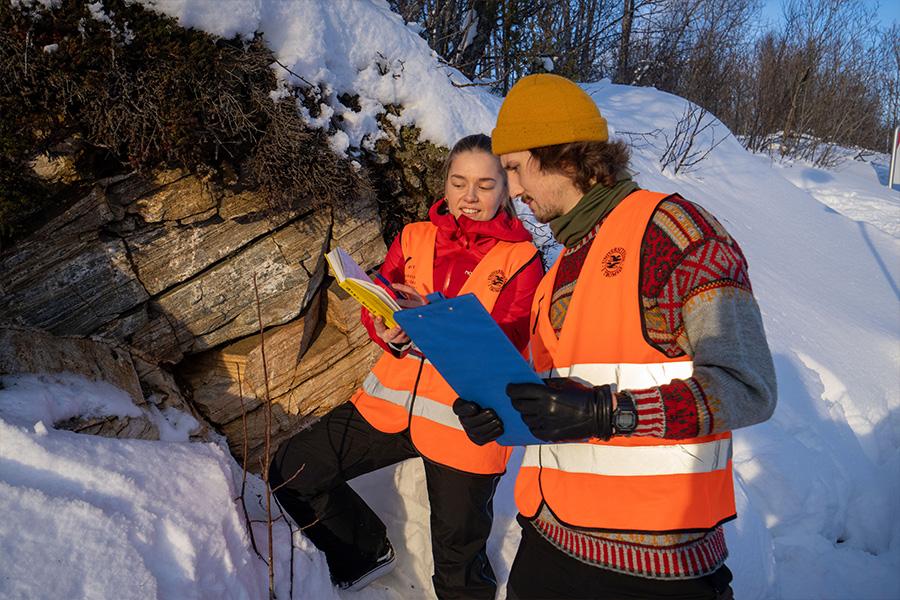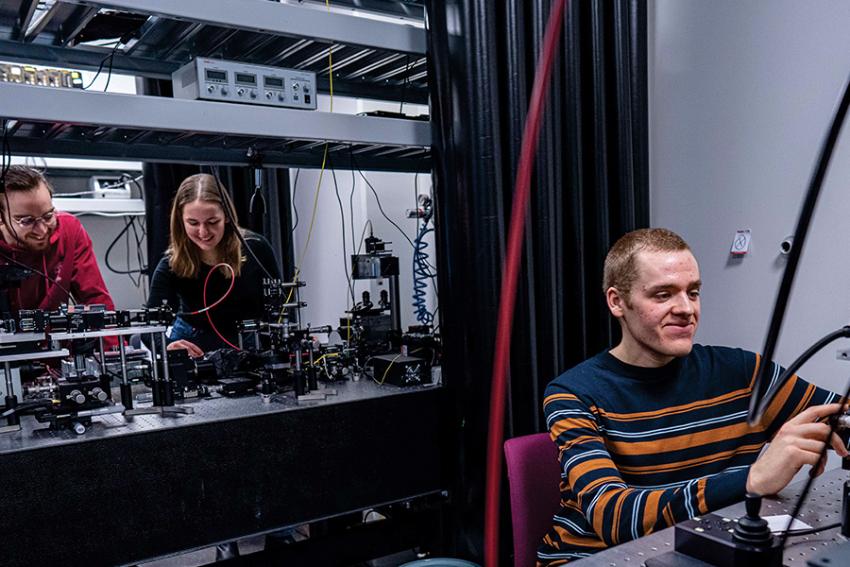Explore the Earth's processes and future challenges with a master’s in Geosciences at UiT. Choose from topics like climate change, geohazards, and natural resources, with opportunities for fieldwork, lab research, and data analysis. Focus areas include northern Norway, Svalbard, and beyond. Preparing you for careers in industry, government, research, or entrepreneurship.
Bachelor's degree or equivalent qualification (180 ECTS) in Geology.
Applicants must have a minimum grade average comparable to a Norwegian “C” (2.5) in the ECTS scale, see the UiT webpage for international admissions for more information on how the point average is calculated.
English language proficiency:
Applicants with education from non-Nordic countries must document English language proficiency. You will find more information on English language requirements on the UiT webpage for international admissions.
Admission capasity:
25 places
Applicants from Norway or Nordic countries:
Her finner du all informasjon knyttet til søking og opptak
Applicants within EU/EEA/Switzerland (except the Nordic countries):
You will find more information about admission for EU/EAA applicants here.
Applicants outside EU/EEA/Switzerland and the Nordic countries:
- Non-EU students must be prepared to pay tuition fees
- You will find more information about admission for Non-EU/EEA applicants here
- Nordic applicants: 4007
- EU / EEA / Switzerland applicants: 7104
- Non-EU/EAA applicants: 2026
Program description
The study consists of a Master's Thesis (60 ECTS) as well as mandatory and elective courses (60 ECTS). The number of elective courses varies in regards to topic(s) of study. You can either follow courses at The University Centre in Svalbard, elsewhere in Norway or abroad.
The Master`s program in Geosciences is aimed at providing students with a solid in-depth education covering, e.g., marine geosciences, structural geology, petrology, mineralogy, ore geology, sedimentology, quaternary geosciences, petroleum geosciences and geohazards
The research undertaken in geology at UiT Arctic University of Norway focuses mainly on fieldwork in Northern Norway, in climate and marine geology with research cruises in the polar areas. We have unique geology right on our doorstep, which offers a special understanding of the processes that continue to shape the earth. Close cooperation with e.g. industry, the public sector and other research institutions ensures that you as a M. Sc. student gain experience in fields relevant for the job market.
Learning outcomes
In addition to a solid competence in a specialized field of geology, students will have acquired the following after completing the Master of Science in Geosciences:
Knowledge
The candidate has
- Advanced knowledge within general geosciences and specialized insight in one or more of the following fields; marine geosciences, structural geology, petrology, mineralogy, ore geology, environmantal geology, quantitative geosciences, sedimentology, Quaternary geosciences, petroleum geosciences, and geohazards.
- Thorough knowledge of scientific theory and geoscientific methods within the selected topic(s). This includes understanding geoscience based on scientific observations from the field and the laboratory.
- The ability to apply geoscientific knowledge in new technological or scientific areas within the selected topic(s).
- The ability to solve geoscientific problems based on the scientific history, tradition, and distinctive character of geosciences. This includes deep understanding of geoscientific data from the field and/or the laboratory as well as understanding of geological time, processes, and products.
Skills
The candidate can
- Critically analyze geoscientific problems using data, methods, and results from peer-reviewed, international geoscientific research literature. The candidate can structure and formulate scholarly arguments building on such information.
- Analyze existing geoscientific theories, use methods and interpretations, and work independently with applied and theoretical solving of geoscientific problems. This regards both the solution of academic research questions and applied aspects of the selected topic(s).
- Use relevant geoscientific methods for research and professional development within the selected topic(s) in an independent manner. This can include field observations, data collection, laboratory analyses, and literature review.
- Carry out an independent, well-defined research project under academic supervision. The project is based on geoscientific field observations, laboratory data, literature or a combination thereof.
- Conduct his/her work in accordance with current ethical standards within the selected geoscientific topic(s).
General competence
The candidate can
- Analyze and carry out the most important elements of academic and professional geoscientific research projects: penetrate literature, carry out field and laboratory research, analyze geoscientific data and communicate results to fellow students and scientists.
- Apply his/her knowledge and skills in new areas for completing advanced tasks and projects within the selected geoscientific topic(s).
- Communicate comprehensive independent work and master geoscientific terminology as well as the use of key literature and academic referencing. This includes communication in the form of written academic theses, research reports, and oral presentations to peer students and geoscientists.
- Discuss, argue, and critically assess geoscientific problems, analyses and conclusions, both with specialists and with the public.
- Contribute to academic, technological and industrial innovation within the geosciences.
Job prospectives
Writing your M.Sc. thesis in geosciences at UiT qualifies you for a large variety of jobs in industry, public authorities and research institutions, both nationally and internationally. Or maybe you even want to start your own business? Our former students work, e.g. with
- Investigations of unstable rock slopes, rock-slope failures and flooding.
- Environmental investigations.
- Carbon capture and storage.
- Exploration and exploitation of natural resources relevant for the Green Shift.
- Searching for oil and gas.
- Own consultancy business.
- Gehazards at The Norwegian Water Resources and Energy Directorate (NVE).
- Geological mapping onshore and offshore at the Geological Survey of Norway (NGU).
- Onshore and offshore investigations in the Arctic and Antarctica at the Norwegian Polar Institute.
- Investigation and management of natural resources at the Norwegian Petroleum Directorate, as well as at the Directorate of Mining with the Commissioner of Mines at Svalbard.
- Planning of new roads and safe infrastructure at the Norwegian Public Roads Administration.
- Research and education at universities and research institutions.
Degree Name
Master of Science in Geosciences.Access to further studies
Successful completion of a Master's degree in Geosciences qualifies a candidate for admission to PhD studies, depending on satisfactory marks in the Master's and Bachelor's degree.
PhD studies in geology are offered at UiT Arctic University of Norway.
Related professions
Study plan
Language of instruction
The language of instruction is English and all syllabus material is in English. Examination questions will be given in English, but may be answered in either English or a Scandinavian language.
The Master's Thesis can be written in either English or a Scandinavian language.
Teaching and assessment
Teaching methods consist of lectures in classrooms, laboratory work in modern lab facilities, fieldwork and cruises to interesting areas, mainly in Northern Norway.
Examinations will be given as written exams, oral exams and reports, depending on the individual course description.
There are several possibilities for exchanges abroad. The exchange period depends on your individual study plan, and should be planned in collaboration with the student advisor and the student’s supervisor.





